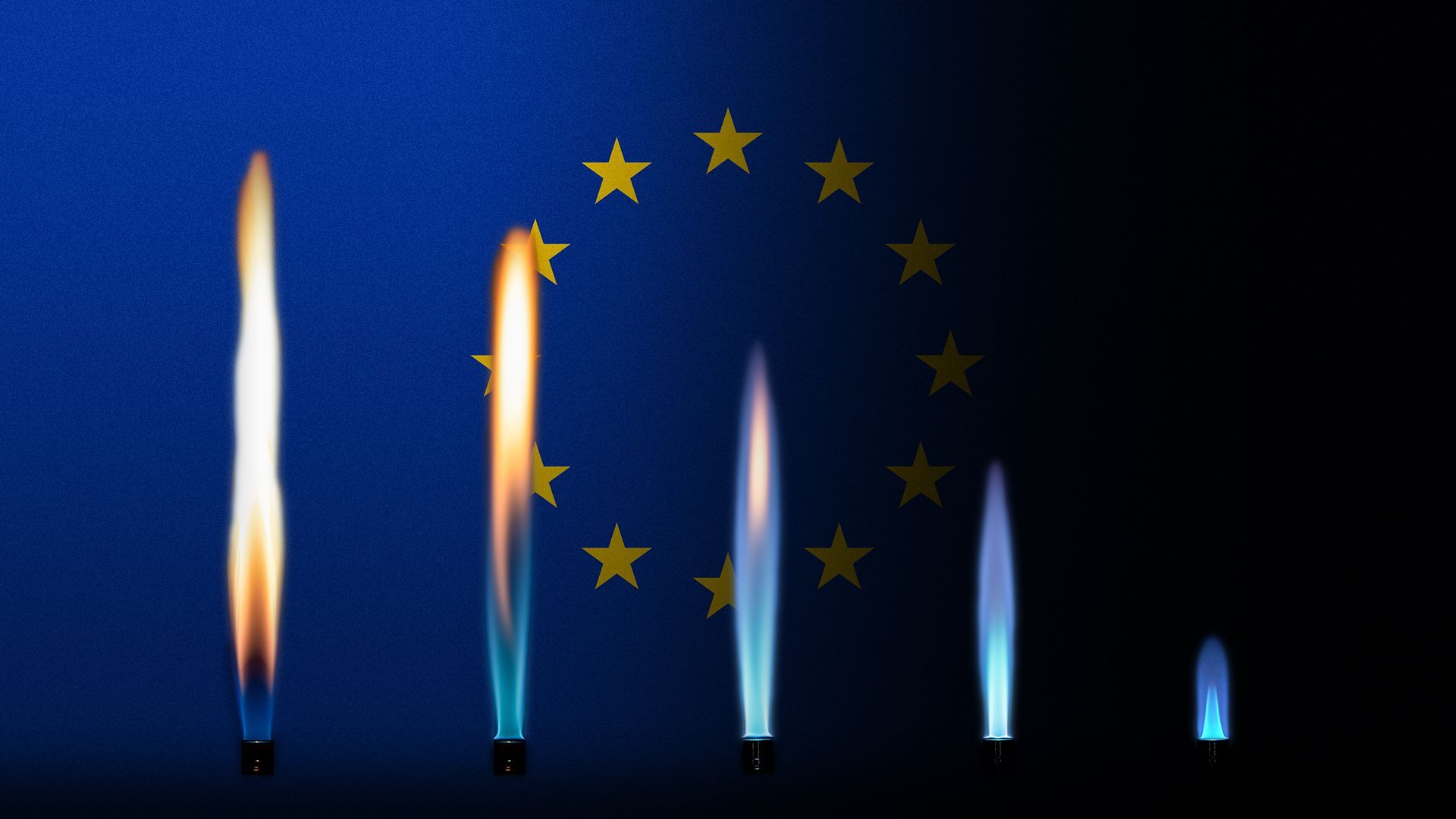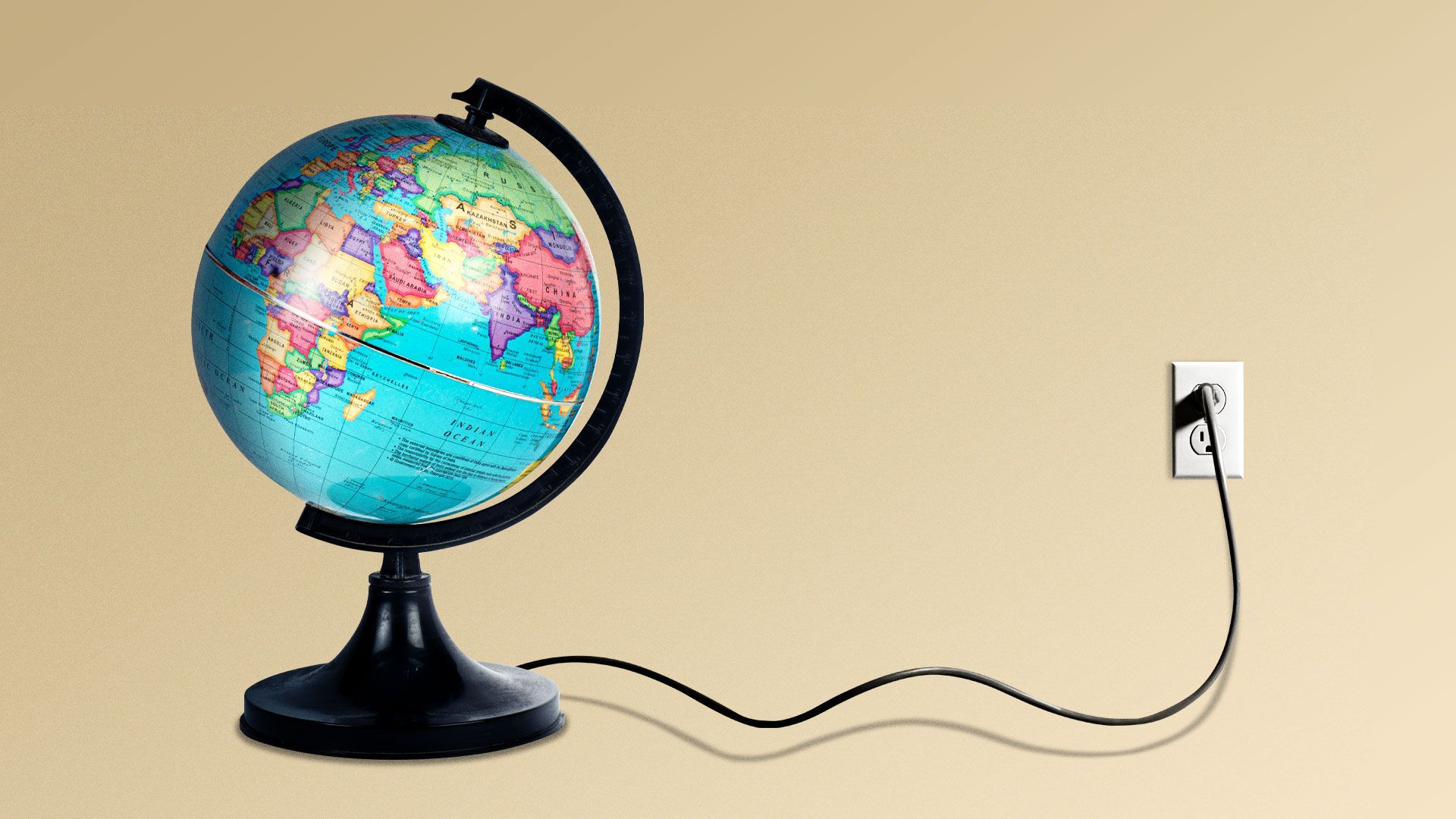| | | | | | | Presented By Enbridge | | | | Axios Generate | | By Ben Geman and Andrew Freedman · Jul 20, 2022 | | 🐪 Yes, Wednesday already! Today's newsletter, edited by Mickey Meece, has a Smart Brevity count of 1,288 words, 5 minutes. 🎶 Today marks the 1993 release date of Cypress Hill's second album "Black Sunday," which provides today's intro tune... | | | | | | 1 big thing: Europe's scorched lessons |  | | | Illustration: Sarah Grillo/Axios | | | | The heat wave in Europe should be viewed as another deadly and startling warning regarding how far we've pushed the planet's climate into less hospitable territory, and how unprepared we are for what's coming, Andrew writes. Catch up fast: In the past week, temperature records dating back centuries have been obliterated, particularly yesterday in the U.K. The heat is shifting east, into a region extending from Germany to Sweden. Why it matters: The heat wave upended life in several major industrialized nations and killed more than 1,700 people, a toll likely to increase. Many of the wildfires it breathed life into are still burning out of control. By the numbers: A staggering 34 weather observing stations in the U.K. provisionally broke the country's all-time high-temperature record yesterday. Between the lines: Nobody was fully prepared. For all the talk of climate adaptation, the U.K., and London specifically, did not fare too well. Threat level: Scientists warn this isn't an aberration. It is clear to scientists that events that used to be unthinkable, such as the heat wave in the Pacific Northwest last year, are swiftly trending toward becoming commonplace. - "Research conducted here at the Met Office has demonstrated that it's virtually impossible for the UK to experience 40°C in an undisrupted climate," said Met Office chief of science and technology Stephen Belcher in a Twitter video.
- "But climate change driven by greenhouse gases has made these extreme temperatures possible."
Yes, but: Even this might not break through. The war in Ukraine is causing an energy crisis that may extend the use of fossil fuel power plants and infrastructure. Read more. |     | | | | | | 2. Breaking: EU moves to ration natural gas |  | | | Illustration: Annelise Capossela/Axios | | | | European Union leaders, citing risks from "the Kremlin's weaponization of gas exports," today proposed plans for the bloc to curb gas consumption until spring, Ben reports. Why it matters: The move reflects growing concern that Russia, the EU's top supplier, could cut exports of the key industrial, electric and residential fuel well beyond already reduced levels. Driving the news: The plan calls for member states to voluntarily cut demand by 15% from August until the end of next March. - The proposed regulation would give EU officials the power to impose mandatory curbs.
- The European Commission vowed to "accelerate work on supply diversification, including joint purchasing of gas to strengthen the EU's possibility of sourcing alternative gas deliveries."
The bottom line: "If the bloc's 27 member countries agree to adopt the plan and the new legislation that goes with it, it would solidify the sense that Europe's economy is on war footing because of Russia's invasion of Ukraine," the NYT reports. Catch up fast: Russian President Vladimir Putin, per multiple reports, said in Iran late Tuesday that the key Nord Stream pipeline would be re-started Thursday after maintenance. But he "warned that flows...could be curbed soon if sanctions prevent additional maintenance on its components," the WSJ reports. |     | | | | | | 3. Charting Europe's economic vulnerability |  Data: IMF analysis; Chart: Simran Parwani/Axios Europe can't avoid economic harm if Russia cuts off natural gas supplies, but policymakers have tools to reduce the damage, the International Monetary Fund said, Ben writes. The intrigue: IMF analysts estimated the GDP effects of Russia going beyond the partial reduction to date and instead implementing an "unprecedented total shutoff." They modeled this risk under two scenarios. - An "integrated" market approach within the EU and globally, where more LNG is available and gas supplies move freely among EU countries.
- A "fragmented" approach with far less access to alternative supplies, marked by shortages and higher prices.
Why it matters: The analysis shows that countries most dependent on Russian gas — and Italy, which relies heavily on gas for electricity — face significant economic blows. Zoom in: One IMF recommendation is moving from measures that limit consumer price increases to allowing more passthrough of high wholesale costs while protecting especially vulnerable households. This would better incentivize conservation, they said. Read the analysis. |     | | | | | | A message from Enbridge | | At Enbridge, our focus is on tomorrow | | |  | | | | We're investing in low-carbon solutions and modernizing our systems to advance the energy transition. Our latest sustainability report shares our progress in meeting our ESG goals and integrating sustainability across our businesses. Explore the report. | | | | | | 4. Biden keeps his powder dry — for now |  | | | Illustration: Sarah Grillo/Axios | | | | President Biden will tout new executive moves on climate today, but he's steering clear — for the moment — of the most aggressive options, Ben writes. Driving the news: He'll announce funding to help protect communities from extreme heat and steps to boost the domestic offshore wind industry, a White House official said, adding more is planned soon. The intrigue: The White House and some Senate Democrats hope the door remains open a crack for a deal with holdout Sen. Joe Manchin (D-W.V.) to move major clean energy legislation, Axios' Hans Nichols and Alayna Treene report. - That's keeping Biden from taking more powerful moves to curb fossil fuels that might antagonize the Manchin, they note.
- Manchin yesterday seemed willing to address climate policy this summer. "Let's see what the Congress does. The Congress needs to act," he told ABC.
What we're watching: Biden is under pressure from some activists and Senate Democrats to formally declare a "climate emergency" that would unlock more executive powers. - White House press secretary Karine Jean-Pierre said yesterday that no emergency declaration is coming this week, but confirmed it's on the table.
- And the White House official told reporters (emphasis added): "Since Congress is not going to act on this emergency, then he will."
|     | | | | | | Bonus: The "emergency" road | | Emergency declarations are not magic wands but do give presidents an expanded suite of tools, Ben writes. What we don't know: The specifics of any potential climate declaration. The emergency route could mean any number of things. The big picture: Options range from expediting permitting and siting for clean energy projects to thwarting some fossil energy production and/or exports, ClearView Energy Partners said in a note. What they're saying: "If the President does pursue a pre-election climate emergency, it might have more to do with green buildout than fossil energy shutdowns (due to energy price concerns)," they said. Go deeper: What happens if Biden declares a climate emergency? (E&E News) |     | | | | | | 5. A world standing still on power emissions |  | | | Illustration: Eniola Odetunde/Axios | | | | Carbon emissions from global electric power are projected to decline less than 1% this year after reaching all-time highs in 2021, the International Energy Agency said, Ben writes. Why it matters: Their annual market analysis out this morning captures a power sector altered by economic headwinds and Europe's energy crisis. But opposing forces effectively cancel each other out on emissions at a time when steep cuts are needed to keep global climate targets within reach. Electric power is the largest global source of CO2 emissions. The big picture: IEA sees global power demand growth at 2.4% this year after surging by 6% in 2021 as economies revived from the pandemic. The 2022 slowdown reflects a decelerating economy, higher prices fueled by Russia's attack on Ukraine, and China's COVID lockdowns. Zoom in: High natural gas prices and EU efforts to ditch Russian gas in Europe are prompting at least a near-term rise in coal use there. - But renewables are continuing their global growth, enough to send overall fossil fuel generation down slightly.
- Add these and other factors up and IEA sees power sector CO2 emissions declining very slightly.
Read the report. |     | | | | | | A message from Enbridge | | At Enbridge, our focus is on tomorrow | | |  | | | | We're investing in low-carbon solutions and modernizing our systems to advance the energy transition. Our latest sustainability report shares our progress in meeting our ESG goals and integrating sustainability across our businesses. Explore the report. | | | | 📬 Did a friend send you this newsletter? Welcome, please sign up. Thanks for reading and we'll see you back here tomorrow. |  | | Why stop here? Let's go Pro. | | | | | | Axios thanks our partners for supporting our newsletters. If you're interested in advertising, learn more here.
Sponsorship has no influence on editorial content. Axios, 3100 Clarendon Blvd, Arlington VA 22201 | | | You received this email because you signed up for newsletters from Axios.
Change your preferences or unsubscribe here. | | | Was this email forwarded to you?
Sign up now to get Axios in your inbox. | | | | Follow Axios on social media:    | | | | | |
Post a Comment
0Comments